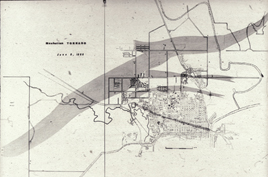Comparative destruction
1966 tornado was last to strike campus, Manhattan
After a tornado leaves town, Mary Knapp knows her phone will ring.
Knapp, an associate agronomist in Research and Extension, is also the state climatologist.
"I keep the archives of weather records in Kansas," she said, "so I have all sorts of weather data."
She fields inquiries from researchers of diverse topics, from the expected (plant and insect development) to the unusual (the correlation between weather and children's activity at recess).
 But since last week's tornado, most callers are asking Knapp about the last time Manhattan and the campus hosted a twister. That was June 8, 1966.
But since last week's tornado, most callers are asking Knapp about the last time Manhattan and the campus hosted a twister. That was June 8, 1966.
"It didn't get as much notice, because that was the same day that Topeka got hit by its tornado," Knapp said.
That outbreak started in western Kansas, just as this storm did, with brief touchdowns in the southwest before arriving in Manhattan.
"The 1966 track was north and west of this tornado," Knapp said. It touched down north of the Amherst neighborhood, and on campus it struck the Jardine complex, which was married student housing at that time, and St. Mary's Hospital (now Mercy Regional Health Center).
After crossing the North Agronomy Farm and Tuttle Creek Boulevard, it hit Strong Avenue in the Northview area. Houses and mobile home parks were badly damaged.
The storm caused about 40 injuries, but no deaths.
"What's interesting to note is how much development has occurred since then in that area," Knapp said. Bramlage Coliseum, the grain science complex, the fire station on Kimball Avenue and Meadowlark Hills all would have been in the path of the 1966 tornado.
"It's easy to think of what might have happened."
The post of state climatologist originally was a federal job. When the National Weather Service divested itself of state climate programs in the late 1970s, Dean Bark, a professor of physics, persuaded K-State administrators and the National Climate Data Program of the job's continuing importance.
Knapp, an expert on computerized decision-making, assumed the post in 1992, the year after the massive Andover tornado killed 13 people and caused $250 million in damage.
"Sedgwick County really gets hit a lot," Knapp said, because of its favorable – or unfavorable – combination of Gulf moisture and jetstream patterns.
"The other factor that comes into play is that tornadoes get noticed when they intersect with populations," Knapp said. A storm that destroys 30 center-pivot irrigators in the middle of wheat country won't generate much news coverage, but the economic effects are considerable.
Knapp does the math: Each destroyed pivot could halve the yield of an entire section of wheat, so at $9 a bushel, "very, very conservatively" a farmer stands to lose $250,000 per section, plus $100,000 for the lost equipment.
More tornado data from Knapp: The Storm Prediction Center notes that Kansas so far leads the 2008 twister derby, with a preliminary count of 172. Iowa lies second, with 134, and Missouri, third, with 127.
Photo: The June1966 twister passed west and north of the path taken by last week's storm.